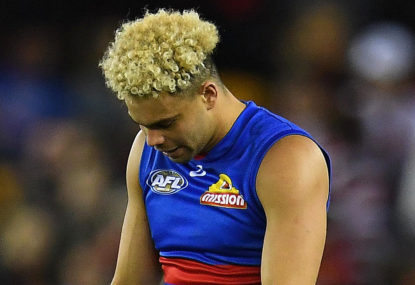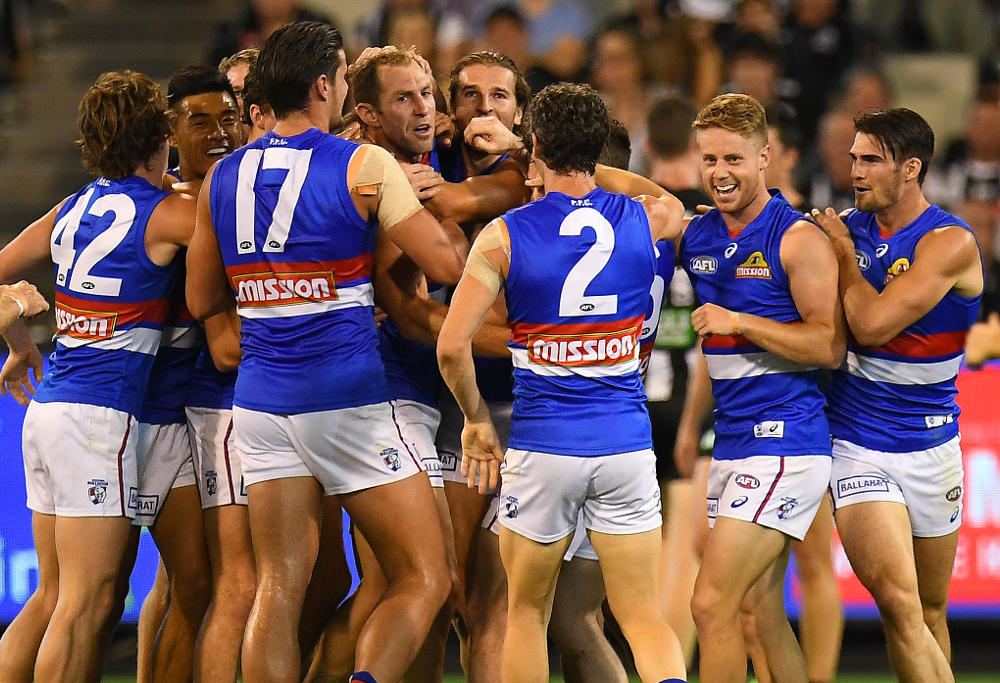The crucial cogs of AFL's Round 7: Which players need to be the difference makers?
We’re taking a look at one player from each team that needs to make a difference this week, starting with the ANZAC Day games.

Just 11 months after embarking on the most remarkable finals run in recent history to capture their first premiership since 1954, the Western Bulldogs have become the first reigning premiers since Hawthorn eight years ago to miss the finals altogether.
The club’s premiership defence came to an abrupt halt when they lost to the Hawks by nine points at Etihad Stadium on Friday night, leaving them in tenth place on the ladder with a final record of 11-11 and a percentage of 97.1.
It spelled the end for club stalwarts Robert Murphy and Matthew Boyd, both of whom have retired, and marked the end of a disappointing title defence, which was eventually undermined by injuries, inconsistent results and personal issues surrounding key forwards Travis Cloke and Tom Boyd.
Cloke is one of several players whose future at the club remains in the balance, after he failed to live up to expectations since crossing from Collingwood at the end of last season.
He and the Bulldogs started the year with a 14-point win over his old club in Round 1, with the man himself kicking a pivotal first quarter goal and letting Pies fans know all about it.
The Dogs proceeded to win four of their next six games to be 5-2 after Round 7, after which they were fifth on the ladder, before back-to-back defeats to the West Coast Eagles and Geelong Cats.
The club then righted the ship with a 40-point win over St Kilda in Round 10, however, after the bye, heavy losses to the Sydney Swans, Melbourne and Adelaide Crows left the club in a precarious position, sparking suggestions of a premiership hangover.
During this time, they lost midfielder Lin Jong to a season-ending knee injury, while Cloke and Boyd both took some time away to deal with mental health issues, with neither playing in the loss to the Hawks on Friday night.
Beforehand, they lost Stewart Crameri to a hip injury, restricting him to just two games for the season, after he’d missed the whole 2016 season due to a doping suspension arising from Essendon’s controversial supplements program in 2012.
Forward Jake Stringer also missed a couple of games due to injuries.
The Bulldogs then lifted to win their next four games before another heavy loss, this time to the Greater Western Sydney Giants by 48 points at home, dropped their percentage below 100.
A loss to Port Adelaide in Ballarat left their premiership defence on life-support, before they were officially killed off on Friday night.
Now, the post-mortem has begun at the Whitten Oval.
[latest_videos_strip category=”afl” name=”AFL”]
As defending premiers, the Bulldogs entered this season with a huge target on their heads.
They won last year’s flag after embarking on a remarkable finals run, which included winning sudden death finals in Perth and Sydney, on either side of ending Hawthorn’s bid for a fourth straight premiership.
They were aided by the controversial pre-finals bye, which was introduced to not only stop coaches from resting players en masse, but also to allow clubs with varying injuries to recover for September.
Some suggested that it was also introduced to give every team an equal chance of winning the premiership.
Until the Dogs’ premiership win last year, no team from outside the top three had won the flag since the Adelaide Crows came from fifth in 1998 (they also won the flag in 1997 after finishing fourth).
Some also suggested that the Dogs won the flag well ahead of time, much like Hawthorn did in 2008, and given the long droughts associated with both premierships it appeared well worth celebrating at the time.
In the Dogs’ case, it had been 62 years since they last won a flag, and it came sooner than anyone anticipated given how much turmoil they endured at the end of the 2014 season.
Similarly, the Hawks’ rise to the top in 2008 came several years after their lowest ebb, in 2004, when coach Peter Schwab was sacked during a shocking season before which he said that the club “could win the premiership”.
But when the tough got going this year, the Dogs simply failed to maintain the previous season’s standards and paid the price for underestimating how hard it would be to defend the premiership.
Some argued that Murphy shouldn’t have played on this year, especially after he had suffered a serious knee injury early last year, but he did so with the intent of bringing up his 300th game, which he did in Round 5.
All up, he played 17 games for the year, a good return, and ended his career on 312 games. He retires as the last player remaining from anyone that made his debut in 2000 or earlier.
His third career game will go down as the one that stood out, as he was part of the Western Bulldogs side that inflicted Essendon’s only defeat of the entire 2000 calendar year.
While his retirement, along with that of Matthew Boyd, has stripped the club of over 600 games’ worth of experience, it will allow the club to continue blooding new players, as they did this year.
Bailey Dale, Lewis Young, Bailey Williams and Patrick Lipinski made their debuts.
As mentioned above, Cloke’s future of will also be a major talking point, after he failed to fire in his first season at Whitten Oval. He managed only ten games, as he first battled a rib injury suffered in the Good Friday win over North Melbourne, and then took time away to deal with mental health issues.
He managed to string together four games towards the back end of the season, before being dropped for Friday’s match against the Hawks.
At age 30, he may still have a few years of good football left in him, but whether he will continue or decide to pull the pin will be seen in the weeks to come.

AAP Image/Julian Smith
Coach Luke Beveridge says his side can bounce back in 2018. If he needs inspiration, he need only look to Hawthorn’s return to the finals in 2010, after missing out the previous year.
After the Hawks won the flag in 2008, several players came into the new season undone, and the club dropped their first two matches. Opposition teams also started figuring out how to untangle ‘Clarko’s cluster’, and coach Alastair Clarkson abandoned this concept midway through the 2010 season.
After losing six of their first seven games to have his coaching future at the Hawks in doubt, the club rebounded to finish seventh on the ladder, before bowing out with an elimination final loss to Fremantle at Subiaco Oval.
They went on to qualify for four consecutive grand finals between 2012 and 2015, winning all bar the first, when they went down to the Sydney Swans by ten points.
They then bowed out in a semi-final to the Western Bulldogs last year, and this year will be absent from September for the first time since 2009.
Perhaps the lessons learnt from the Hawks’ failed premiership defence of eight years ago, and the Bulldogs’ own failed campaign this year, will help lift them back up the ladder in the years to come.